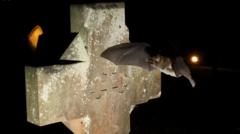Russia’s Burevestnik Nuclear-Powered Missile Is a Very Bad Idea
NegativeScience
Russian President Vladimir Putin has announced a successful test flight of the Burevestnik, a nuclear-powered cruise missile. This development raises significant concerns about global security and the potential for an arms race, as the missile's capabilities could challenge existing military balances. The implications of such technology could be far-reaching, making it a critical issue for international relations.
— Curated by the World Pulse Now AI Editorial System






